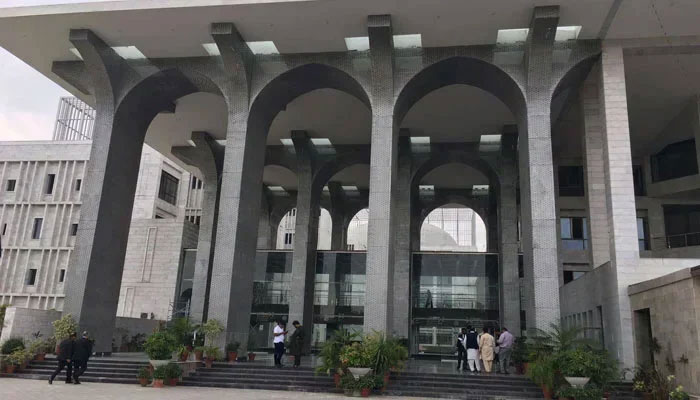Senior judge to mark cases in IHC CJ’s absence, says circular
According to circular, in absence of CJP, additional registrar will seek instructions from him to form benches
ISLAMABAD: The Islamabad High Court registrar on Saturday issued a circular with the chief justice’s approval, stating that the authority to form benches solely rests with the chief justice. However, the power to mark cases will be exercised by a senior judge/administrative judge if the chief justice is not available.
According to the circular, in the absence of the chief justice, the additional registrar will seek instructions from him to form benches. In case of any kind of leave of the chief justice, the available senior judge can mark cases.
It should be noted that on November 3, 2023, the brother of Sher Afzal Marwat, a PTI lawyer and accused in a case, had approached the Islamabad High Court for his brother’s protective bail. However, the registrar’s office returned the bail petition with an objection, stating that the applicant’s brother cannot file this application without his power of attorney.
Due to the chief justice’s unavailability, administrative judge Justice Mohsin Akhtar Kayani heard an appeal filed against the objection. The applicant’s lawyer argued that a blood relative can file such a petition, following which many other lawyers present in the courtroom also informed the judge that they had filed similar requests for bail for their clients on an urgent basis. However, due to the chief justice’s absence, their hearings have not been scheduled.
If they are not fixed today, their clients may face irreparable losses and could potentially be arrested by the law enforcement agencies, they said. The judge subsequently examined the relevant rules and regulations and upheld the objections raised by the office. However, he recommended regulating the powers of senior judges/administrative judges in matters of urgent nature and referred the matter to the chief justice to place it before the administrative committee for consideration and a final decision.
-
 Everything We Know About Jessie J's Breast Cancer Journey
Everything We Know About Jessie J's Breast Cancer Journey -
 Winter Olympics 2026: What To Watch In Men’s Hockey Today
Winter Olympics 2026: What To Watch In Men’s Hockey Today -
 Winnie Harlow Breaks Vitiligo Stereotypes: 'I'm Not A Sufferer'
Winnie Harlow Breaks Vitiligo Stereotypes: 'I'm Not A Sufferer' -
 Apple Martin Opens Up About Getting 'crazy' Lip Filler
Apple Martin Opens Up About Getting 'crazy' Lip Filler -
 Why Did OpenAI Remove One Crucial Word From Its Mission Statement?
Why Did OpenAI Remove One Crucial Word From Its Mission Statement? -
 Prince William Warned His Future Reign Will Be Affected By Andrew Scandal
Prince William Warned His Future Reign Will Be Affected By Andrew Scandal -
 Amy Madigan Reflects On Husband Ed Harris' Support After Oscar Nomination
Amy Madigan Reflects On Husband Ed Harris' Support After Oscar Nomination -
 Is Studying Medicine Useless? Elon Musk’s Claim That AI Will Outperform Surgeons Sparks Debate
Is Studying Medicine Useless? Elon Musk’s Claim That AI Will Outperform Surgeons Sparks Debate -
 Margot Robbie Gushes Over 'Wuthering Heights' Director: 'I'd Follow Her Anywhere'
Margot Robbie Gushes Over 'Wuthering Heights' Director: 'I'd Follow Her Anywhere' -
 'The Muppet Show' Star Miss Piggy Gives Fans THIS Advice
'The Muppet Show' Star Miss Piggy Gives Fans THIS Advice -
 Sarah Ferguson Concerned For Princess Eugenie, Beatrice Amid Epstein Scandal
Sarah Ferguson Concerned For Princess Eugenie, Beatrice Amid Epstein Scandal -
 Uber Enters Seven New European Markets In Major Food-delivery Expansion
Uber Enters Seven New European Markets In Major Food-delivery Expansion -
 Hollywood Fights Back Against Super-realistic AI Video Tool
Hollywood Fights Back Against Super-realistic AI Video Tool -
 Meghan Markle's Father Shares Fresh Health Update
Meghan Markle's Father Shares Fresh Health Update -
 Pentagon Threatens To Cut Ties With Anthropic Over AI Safeguards Dispute
Pentagon Threatens To Cut Ties With Anthropic Over AI Safeguards Dispute -
 Samsung Galaxy Unpacked 2026: What To Expect On February 25
Samsung Galaxy Unpacked 2026: What To Expect On February 25




